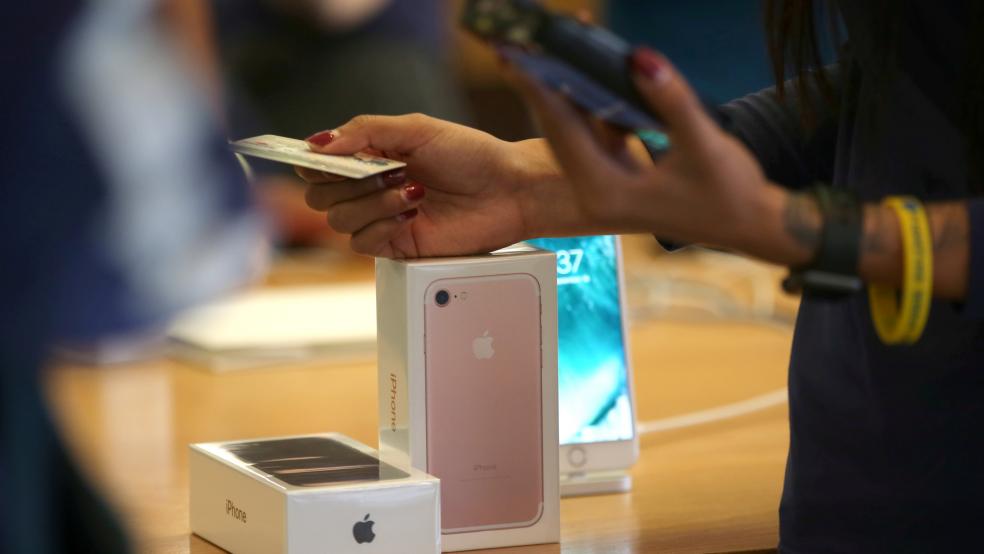Nobody knows what president-elect Donald Trump is likely to do economically when he becomes president, but one thing that he has repeatedly promised to do is to put a tax on imports from China.
This is worrying for American consumers. Lots of our goods are made in China, even premium electronics like Apple's iPhone. According to economists, a tariff on Chinese goods could cause electronics prices to rise.
Related: How Trump's Economy Can Go Right (or Wrong)
Trump even threatened that he could put a 45% tariff on goods from China — which means when something gets shipped to the US, the government would take 45% of its value in taxes.
Luckily, the tariff isn't likely to be 45%, according to economics research by Barclays published last week. Most likely, a Trump administration would settle on a 15% tariff on imports from China, analyst Michael Gapen and team wrote.
But that doesn't necessarily mean the price of an iPhone would go up by 15%.
"In general, if tariffs go up by 15%, we tend to find that prices go up, but not usually entirely by 15%," Columbia economics professor Amit Khandelwal told Business Insider. "But it's reasonable to expect that prices would go up a sufficient amount."
"Tariffs are imposed on wholesale price, so if I've got my $1,000 computer in front of me, it came in to the airport wholesaler valued at probably $500 or less," NYU Stern economics professor Paul Wachtel said.
That suggests iPhone prices could rise as much as $97 per phone, but they would likely rise less — maybe $50, as has previously been estimated.
Related: 8 Tips if You Want to Travel to Cuba (Before It's Too Late)
There's also the chance that a rich company like Apple could decide to eat the tariff, and absorb the cost from its own profits. But while the immediate impact could be limited, what happens next could be a big deal for the electronics industry.
A trade war
"Whether an iPhone is going to go up in price $10 or something is a small issue," Wachtel said. "If President Trump starts putting tariffs on electronic goods, does that begin to wreak havoc on the global electronics industry? Now you're talking a real issue."
A big danger for American companies like Apple is if China retaliates by taxing imports from the United States.
That's exactly what was threatened in an op-ed published on Sunday in the Global Times, a state-run Chinese newspaper.
The author of the editorial even threatened Apple directly.
"China will take a tit-for-tat approach then. A batch of Boeing orders will be replaced by Airbus. US auto and iPhone sales in China will suffer a setback, and US soybean and maize imports will be halted. China can also limit the number of Chinese students studying in the US," the author wrote.
China could raise the tariff on American imports, or it could make like hard for Apple in other ways, like by increasing regulatory scrutiny or promoting home-grown alternatives.
A "trade war" like the editorial suggests would "increases all kinds of uncertainty in the global trading economy, which is unhealthy for all economies involved," Wachtel said.
Related: A Climate Change Doubter Will Overhaul the EPA in Trump’s Administration
The jobs aren't coming back
The reason why Trump made the 45% tariff promise was to appeal to manufacturing workers who see the policy as protecting American trade.
"I'm going to get Apple to start making their computers and their iPhones on our land, not in China. How does it help us when they make it in China?" Trump asked during a rally in March.
"If I'm a worker at an electronics factory, I might get shielded from competition, that might be a beneficial thing, but then prices for goods are going up," Khandelwal said.
But "low-end" electronics like iPhones are not currently made in the US and are unlikely to start. Nearly every part included in an iPhone — the chips, the screen, and the buttons — is made in Asia.
"A large part of the reason electronics moved overseas is because of the entire supply chain over there," Khandelwal said. "It may be a lower cost to produce the final product as compared to the US, but there's also an advantage is that you're close to your other input suppliers who are other parts of the East Asia supply chain."
"It's most advantageous for the entire world economy to have these things manufactured where the cost of manufacturing is lower. By impinging on trade you make everybody worse off, and you're not going to be bringing particular factories back to Ohio, Michigan, or anywhere else," Wachtel said.
"Not only is it a bad idea, it wouldn't even happen," he said.
If a Trump administration shamed Apple or another electronics company to bring its manufacturing back to the United States, one possibility would be to make iPhones in a factory staffed with robots.
"You could end up with a situation where the factory actually comes back to the US but they just figure out how to automate more," Khandelwal said. "It's not obvious that in China a product that needs 100 people would employ the same number of people in the United States."
This article originally appeared on Business Insider. Read more from Business Insider:
GOLDMAN: Trump is bad news for the world economy
The company that makes the opioid OxyContin has a lot to thank Rudy Giuliani for
A new study shows that areas in the US hit hardest by trade have become more politically polarized




